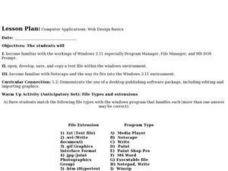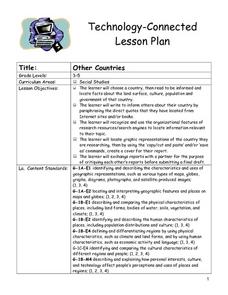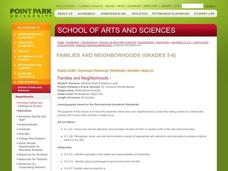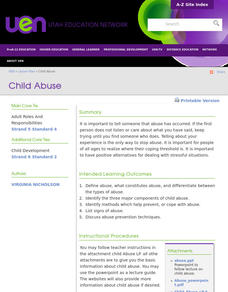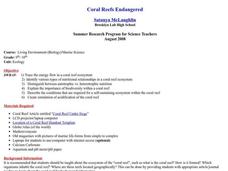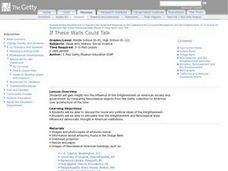Curated OER
Computer Applications: Web Design Basics
High schoolers become familiar with the workings of Windows 3.11 especially Program Manager, File Manager, and MS DOS Prompt. They open, develop, save, and copy a text file within the windows environment. They become familiar with...
Curated OER
Fabric Construction Chart
Students in sewing class review the various types of natural and synthetic fabrics. They take notes about fabric construction and match woven, knit, and non-woven fabric samples to fabric construction charts. They make specific...
Curated OER
Worksheet 20
In this math learning exercise, they write down and solve a differential equation governing the motion of an underdamped spring. Then they find the solution to the initial value problem.
Curated OER
Classifying Monocot And Dicot Plants
Sixth graders identify the parts of a flower, and tell the difference between monocots and dicots. They group plant by leaf types and characteristics placing the information in table form on the computer.
Curated OER
Other Countries
Students select a country and conduct research on the culture, population, geography, and government of their country. They conduct research using the Internet and a variety of resource books, and write and publish a report that...
Curated OER
Families and Neighborhoods
Students build their own neighborhood. In this instructional activity on community, students are introduced to books about families and neighborhoods. As a class, the students create their own neighborhood, elect a leader for their...
Curated OER
Pecan Lessons
Students complete lessons on the computer related to pecans. Students complete assignments such as typing descriptions of pecan categories, using email to find out information, researching the internet about production regions, and more.
Curated OER
Child Abuse
Students define abuse, and identify the three major components of child abuse. They identify methods that help prevent, or cope with abuse, and prevention techniques.
Curated OER
Human Trafficking & Modern Day Slavery - Laws & Conventions
Students are introduced to the topic of human trafficking. They identify the reasons why people are trafficked and the laws and conventions around the globe that punish this type of behavior. Using the internet, they describe how the...
Curated OER
Shopping for Souvenirs In the Middle East
Students participate in a role play in which they are shopping for souvenirs in the Middle East. Using maps, they locate the Middle East and identify each country within the region. They create a key map for the types of souvenirs that...
Curated OER
Simple Machines
Third graders are introduced to the six types of simple machines and discover how they make tasks easier. In groups, they rotate between stations to experiment with the different types of simple machines. To end the lesson, they make a...
Curated OER
Coral Reefs Endangered
Learners identify different types of nutritional relationships in a coral reef system and trace the energy flow. In this marine biology lesson students create a simulation of acidification of the coral reef.
Curated OER
If These Walls Could Talk
Students investigate the influence of the Enlightenment on American society and government. In this Enlightenment lesson plan, students work cooperatively in groups to define the principles of the Enlightenment, American democracy, and...
Curated OER
Abuse and Neglect
Students identify the types of child abuse, how it occurs, and how to report it. They listen to a guest speaker lecture on child abuse and how to prevent it.
Curated OER
Food Poisoning
Students study the prevention of the four major types of food poisoning. They write a letter of advice to an imaginary friend who has had food poisoning seven times within the last year.
Curated OER
Our Important Wetlands and Uplands
Students define wetlands. They list the benefits wetlans provide to man and nature. They compare types of wetlands that exist in northeast or east-central Florida. They list ways uplands affect wetlands and other water bodies.
Curated OER
Science: Create Your Own Rock
Second graders create rocks using colored paper to represent the various minerals. After reviewing the various minerals contained in rock, they cut pieces of scrap paper and paste them on handouts. Finally, 2nd graders give their rocks...
Curated OER
Milk and Dairy, Day 1
Students review different types of milk products and their characteristics, demonstrate how to select and prepare milk and milk products, identify standard serving sizes, define terms associated with milk and milk products, and practice...
Curated OER
The Human Geonome Project Structured Controversy
Students debate government funding of the Human Genome Project. In this ethics lesson plan, students use the stuctured controversy framework to research the opposing viewpoints regarding project funding.
Curated OER
Eastern Woodland Indians
Fifth graders research the Eastern Woodland Indians in this lesson. They list the tribes and write a description of the physical environment. They list examples of the types of food, clothing, transportation, home/shelter,...
Curated OER
ADULT ESOL LESSON PLANS--Maintaining Employment
Pupils analyze payroll deductions from their pay stubs to view a variety of government services and company benefits. After defining the vocabulary words on the board, they associate those words to certain sections on their pay stubs.
Curated OER
Peer Pressure
Sixth graders make estimations, calculations, and to collaborate with other students to solve a problem. It also teaches valuable refusal skills to combat negative peer pressure and provides students an opportunity to role play. ...
Curated OER
Taxes: Where Does Your Money Go?
Young scholars explore the concept of taxes. In this tax lesson, students investigate types of taxes and deductions taken out of a paycheck before they see it. Young scholars calculate the tax on a given dollar amount. Students...
Curated OER
Montreal Drivers: A Negative View
For this negative verb forms worksheet, students complete a 15 question multiple choice on-line interactive exercise. Students read a sentence about bad drivers in Montreal. Students change the verb in bold type to the negative form.


